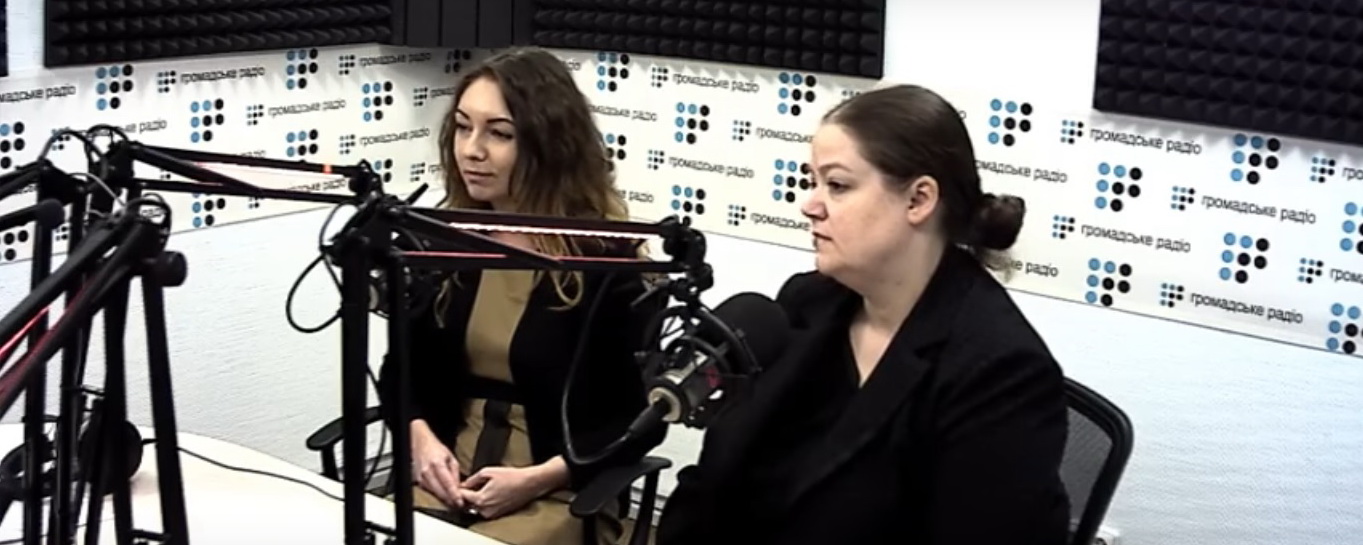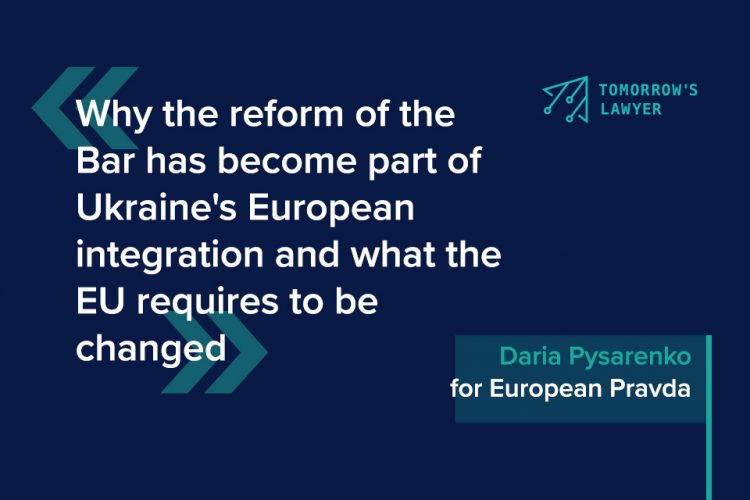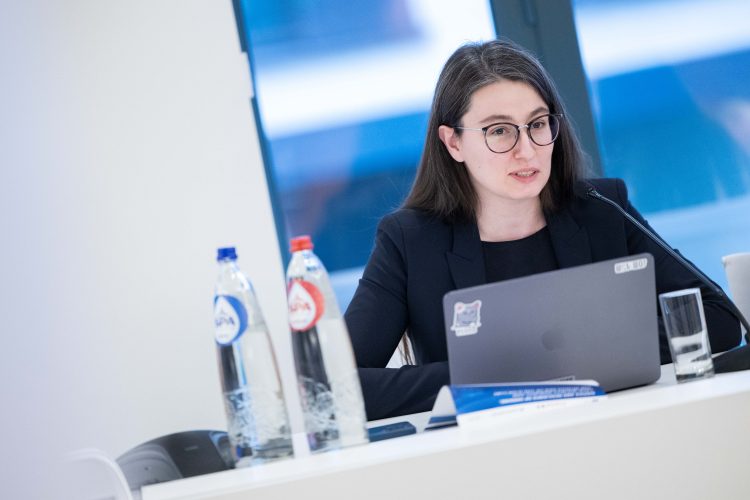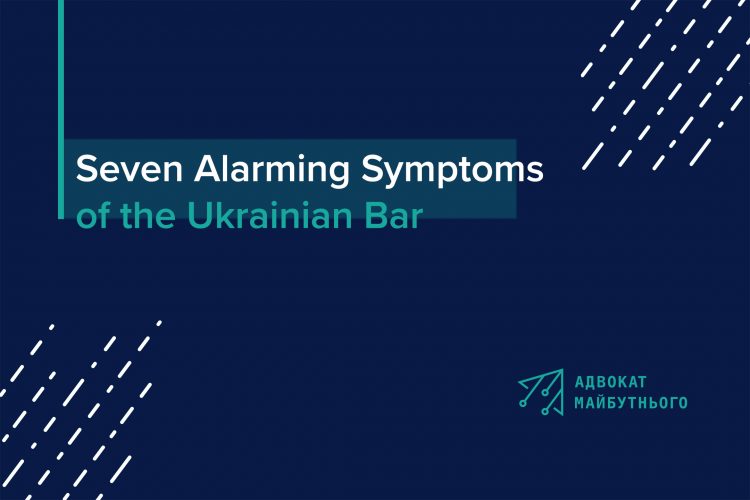


Lawyer in Ukraine May Become the Agent of Change
In Ukraine, the Tomorrow’s Lawyer was launched for the professional development of lawyers, designed to support the community of like-minded professionals and improve the quality of legal assistance.
Who are the tomorrow’s lawyers, what professional competences they possess and what knowledge do they need, – these questions were answered by Larysa Bizo, Director of the Tomorrow’s Lawyer Program and Oksana Kikot, Manager of the Program.
Larysa Denysenko: Who is the “Tomorrow’s Lawyer” and what is the difference between the lawyers of today? How does the role of the lawyer change and how lawyers should change given the reform of justice?
Larysa Bizo: Since our project is designed to support and develop a system of free legal aid, it is very important for us to take into account the needs of clients who will use these services. First of all, we need to develop the relationship between the lawyer and the client. It is very important to develop the skills and abilities of attorneys who will provide legal services.
Knowledge of the law, the justice system is one thing, the ability to work with the client, to understand the needs, the problems – this is different. When evaluating different educational needs, it became clear that it was necessary to develop these skills in terms of effective communication not only with the client, but with other stakeholders. To this end, a working group was set up with the Ukrainian Bar Association (UBA), Canadian Bar Association (CBA), and the Bar Association of Legal Aid Providers (BALAP).
Last spring we had an assessment session, our colleagues from the Canadian Bar Association arrived, together with our Ukrainian colleagues, we evaluated the needs and met with the lawyer community in the regions in Kyiv. This became the basis for the development of the program concept
Oksana Kikot: We believe that the Bar is a key link in the justice system. This program is aimed specifically at lawyers. According to world trends, attorneys now not only provide legal services or legal assistance. They promote best practices in the justice system; act as leaders in the implementation of reforms in the justice system, in access to justice and in general rule of law.
The program will aim to not only develop the individual skills of lawyers, but also create a platform for them, where they can unite, exchange experience, best practices, which they have worked out. These are experienced lawyers that we selected in competition, they have at least two years of experience and achievements, including in community activities.
Irina Slavinska: What competencies do you want to emphasize?
Oksana Kikot: These are the knowledge, skills, behavioral aspects and values. Within this program, we will talk a lot about values and ethics. Ethics is a cross-cutting theme of the program that will be present in each of the modules. The annual advocacy training in the world involves an enormous part of the training aimed at developing skills to meet the highest ethical standards in their work.
Our Canadian colleagues consider ethics to be a key issue even in the daily life of a lawyer. They shared with us an example of Canadian advocates who are very cautious in order to avoid even minor violations – to put it mildly, not to park the car where it is not allowed. Even such moments can affect the reputation of the lawyer and how it will be perceived by the community and clients.
Larysa Denysenko: How can the Canadian lawyers’ voices be heard through the media? How do they comment on events and touch upon the important human rights issues?
Larysa Bizo: Very actively. And they are very positively perceived by the population. The Canadian Bar Association and other Canadian judiciary organizations consider them to be very professional, and their proposals are positively perceived, they are constantly striving to ensure respect for human rights or certain social aspects.
Larysa Denysenko: How Ukrainian lawyers are perceived by the society as politically engaged?
Oksana Kikot: There are several aspects here, one of them is ethical. And we will talk a lot about it. There is one more point that we’ve found out from assessment sessions – this is the identification of lawyers with clients. According to the lawyers we talked about, this is a rather serious problem in Ukraine.
Iryna Slavinska: That is, if you are an attorney defending an odious figure, what will happen?
Oksana Kikot: The public can perceive this so that a lawyer is as odious as his client, shares his views, lifestyle.
Larysa Denysenko: But there are occasions when lawyers do associate themselves with clients and openly share their views. Sometimes a lawyer does not distinguish the boundaries of political interests and purely professional engagements and obligations.
Oksana Kikot: We believe that our lawyers should learn this science. One of our modules is dedicated to the way we talk about how to communicate with the public, with the media in such a way as to communicate our position, client’s rights, but not to be associated with clients or its case.
Irina Slavinska: We talked about analogy with the work of lawyers in Canada about high standards of ethics. To what extent does this experience, the rule of law rule may overlap with the Ukrainian situation?
Larysa Bizo: For us, this was one of the aspects we looked at in our approach to develop the program. I wanted to have the opportunity to establish ties between associations and lawyers, but realized that these are two separate worlds and traditions. We tried to work with our Canadian counterparts to develop the first versions of the program. The working group included many different Ukrainian lawyers and scholars, who took efforts to adapt the program so that it corresponded to Ukrainian realities.
Of course, certain ethical issues, norms and their observance – this should be the same in any country. But the context is different. And in this case: how does a lawyer have to deal with the system, be active and adhere to the rules? Experts joined us and completed the program curricula. Therefore, the context of the training comes from Ukrainian realities. When choosing trainers for the program, we thought that it would be wrong to take Canadian experts – it was important for us to develop the capacity at the local level, so the trainers of the program were Ukrainian. Of course, Canadian coaches come to share their experiences.
Larysa Denysenko: If we talk about the school of mentoring, about the people who teach at the law schools, how much this is developed in our country? How do lawyers themselves realize their responsibility to raise a new generation and share experience?
Oksana Kikot: I think the mentoring institute in our country is underdeveloped. This is one of the reasons why we invest in Ukrainian trainers. We would like to continue to pay attention to this in Ukraine. We felt this need, including working with a system of free legal aid. An extremely large number of lawyers after universities enter the legal society and need more experienced colleagues who could help master practical skills that, unfortunately, are not taught at universities.
Iryna Slavinska: Why is there a problem with the establishment of a mentoring institute?
Oksana Kikot: We asked our colleagues in Canada why it works there. They believe one of the key factors why it exists is the prestige of the mentor and coach due to their mentoring work. The Canadian Bar Association has included mentoring into the scope of their activities. They invite mentors who work with their members. No coach in Canada gets paid for his work. It is considered prestigious to transfer knowledge and experience.
Larysa Bizo: They want to make a contribution so that they will have something left when they retire. That is why they feel responsible for educating young lawyers.
Adapted from Hromadske Radio


